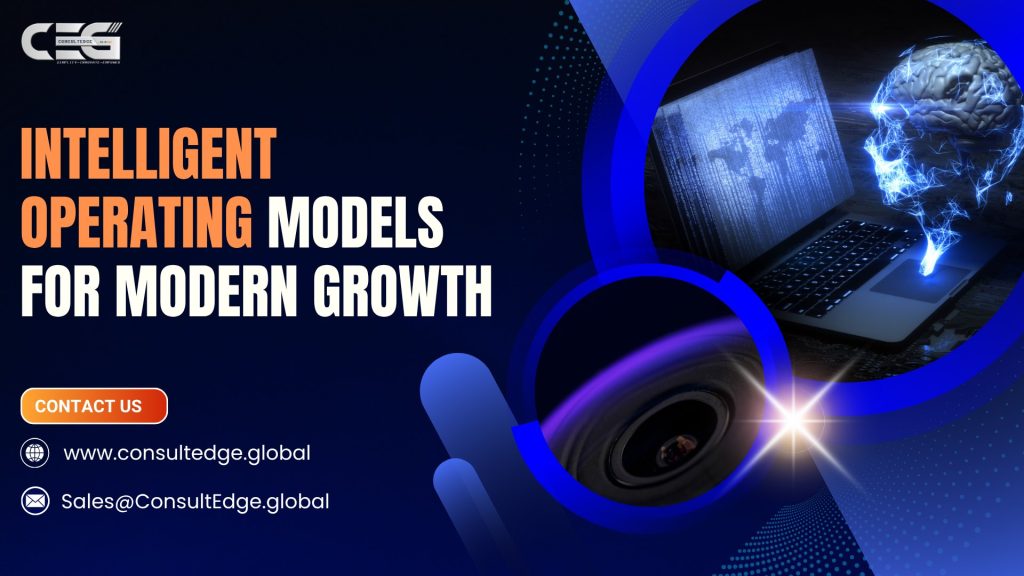Intelligent Operating Models for Modern Growth

In today’s fast-changing and technologically changing world, businesses are continuously seeking smarter, faster, and better ways of getting things done. In India, the transformation took place in the form of greater adoption of the smart operating model—a paradigmatic shift that is reshaping success and transforming industries. Through the convergence of business innovation solutions with emerging technologies such as artificial intelligence (AI), automation, and data analytics, organizations are building future-proof, agile, and sustainable operations.
Understanding the Intelligent Operating Model
A smart operating model is a new type of model that unites people, processes, and digital technology in a bid to make businesses smarter. Unlike older models founded on stiff hierarchies and back-breaking work, smart models focus on flexibility, decision-making based on facts, and automation.
With the pro-business climate of India, intelligent models are becoming a game changer. Right from large IT groups to small production units, every business is adopting this model in its quest to improve customer satisfaction, improve the efficiency of workflows, and respond rapidly to market changes.
Key Drivers of Change in India
Digital Transformation: Indian businesses are fast moving from analog to digital-led processes—from embracing mobile apps, cloud computing, and data platforms.
Process Optimization: Reducing waits and inefficiencies in processes is paramount. Smart models provide real-time visibility to examine and correct bottlenecks.
Automation Strategy: Automating routine, time-consuming processes increases productivity and reduces human mistakes.
Enterprise Agility: Organizations need to respond quickly to marketplace changes, and intelligent models make them more responsive and agile.
Scalable Innovation: Business innovation solutions enable companies to create new ideas, products, and services faster than ever before.
Building Blocks of a Smart Operating Model
1. Digital-First Mindset
Digitalization is not about adopting new technology. It means viewing the entire business strategy. Banks, telecom companies, and Indian government departments are already taking humongous strides towards digitalization—leading to quicker delivery of services and more customers.
2. AI-Driven Operations
Artificial Intelligence is helping business companies in decision-making automation, pattern recognition, and forecasting future patterns. In retailing and logistics, AI is aiding in demand forecasting, stock management, and personalized customer experience.
3. Automation Strategy
There must be an effective automation strategy. This would imply choosing what to automate with the assistance of manual processes through the use of software tools like RPA (Robotic Process Automation), AI robots, or workflow automation software. An example is a BPO company can automate verification of documents, which releases thousands of hours annually.
4. Process Optimization
With performance metrics and analytics dashboards tracked, companies are continually optimizing performance. Metrics tell where efficiency is being sacrificed, wasteful spending, or regulatory loopholes—leaving behind streamlined, speeded-up operations.
5. Enterprise Agility
With today’s uncertainty, enterprise agility allows companies to adapt on a nickel. From product launch to market entry, agile operations minimize risk and maximize speed to market.
Industry Impact: Real-World Examples
In every industry, smart models are achieving measurable outcomes:
Healthcare: Artificial intelligence is being employed in hospitals for diagnosis and patient scheduling. Telemedicine services, enabled by automation, are reaching out to rural India.
Manufacturing: Smart factories employ IoT sensors and AI to reduce downtime, optimize energy consumption, and boost production.
Finance: Internet banks and financial technology companies employ AI-based algorithms to identify fraud, credit score, and provide 24/7 customer support through chatbots.
These changes are expense-reducing and support business innovation solutions that drive customer loyalty and incremental revenues.
Implementation Challenges
Though the benefits are numerous, a few Indian business companies fail to execute smart operating models:
- Insufficient AI, data science, and automation solution experience
- Resistance to change by the conventional business teams
- Security and compliance risk of digital platforms
- Investment for transformation
Addressing these challenges requires sequential action—small pilot projects in the beginning, building in-house capabilities, and partnering with appropriate technology partners.
The Way Forward: Intelligent Operating Model India
India’s digital economy is growing at a fast rate. As the country moves towards becoming a global innovation hub, businesses need to be reactive to new modes of working.
Investing in smart models provides organizations:
- Enhance customer experience
- Operational efficiency and cost savings
- Enhanced employee engagement
- Scaling innovations at a quicker pace
Conclusion
Smart operating model India is not a revolution in technology—it is a transformation in strategy. Those firms which undertake the AI-driven operation, process excellence, and strategic approach to judicious automation journey will be best placed to compete in an economy that is competitive.
We at ConsultEdge.Global specialize in enabling enterprise change through customization of business innovation solutions. Our experienced professionals help organizations to transition to digital transformation, enable agility, and realize sustainable growth.
If you’re ready to reshape your operations and lead in the digital era, ConsultEdge is your trusted partner on this journey.
You May Also Like
 Ensuring Compliance and Governance with Sophos Solutions
Ensuring Compliance and Governance with Sophos SolutionsEnsuring Compliance and Governance with Sophos Solutions Comprehensive Security and Compliance Across Enterprise Environments Modern...
 خدمات وحلول سحابة AWS الموثوقة في دبي وعبر الإمارات
خدمات وحلول سحابة AWS الموثوقة في دبي وعبر الإماراتخدمات وحلول سحابة AWS الموثوقة في دبي وعبر الإمارات تحول سحابي شامل بخبرة شريك AWS...
 تأمين بيئات DevOps باستخدام حلول Sysdig للمؤسسات في الإمارات
تأمين بيئات DevOps باستخدام حلول Sysdig للمؤسسات في الإماراتتأمين بيئات DevOps باستخدام حلول Sysdig للمؤسسات في الإمارات تتبنى دبي والإمارات DevOps لتسريع توصيل...



